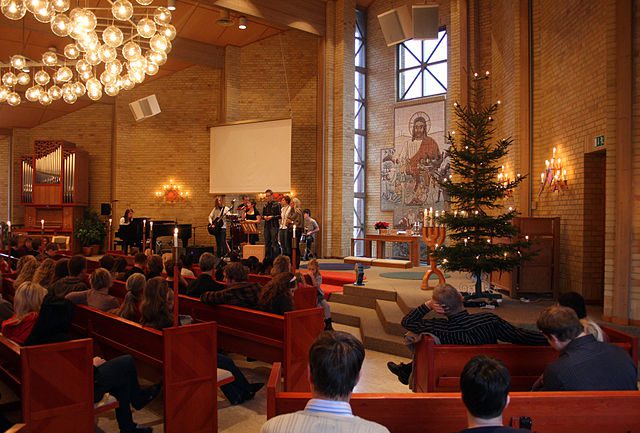Having spent time lately in the “happiest” countries that are also allegedly among the least religious, I have pointed out that they are not nearly so “secularist” as they are usually portrayed. (Do a search on my blog for my posts on Christianity in Finland, Denmark, Scandinavia, and Australia.) Now Christian Smith’s sociology of religion, as developed in his book Religion: What It Is, Why It Works, and Why It Matters, gives us some new ways of thinking about secularism.
Like other scholars, Prof. Smith discredits the “secularization theory,” the notion that modernity brings about a decline in religion. This certainly hasn’t happened in the developing world. Western Europe, though, would seem to be an anomaly. Prof. Smith acknowledges that religions can fade, lose adherents, and change. But religion, he says, is innate to human beings, and hardly any society is truly without it.
“No human society has existed that did not include some religion. A broad array of religions exists around the globe today, with a single religion dominating society in some places, while in others many traditions mix, morph, and clash. Efforts by some modern states to do away with religion have failed. Though thin and weak in some regions, religion is robust and growing in other parts of the world.” (1-2)
Secularization is relative and specific to a religion, he says. Secularism sometimes is not so much the absence of religion but a change in the religion. Many societies with little apparently “religiousness” (a quality he contrasts with “religion” as such) continue to have a strong religious presence in its “deep culture.”
Prof. Smith encourages his fellow social scientists to concentrate on religious practices, not just religious beliefs. And he offers a new way to assess religious cultural influence.
Consider Scandinavia’s religious practices. (These are my musings, not Prof. Smith’s.) In these supposedly “secularist” countries, church membership remains extremely high, around 80% (even though this means paying a church tax of 1-1.5% of one’s income). Virtually everyone has been baptized. Virtually everyone goes through confirmation, gets married in church, baptizes their children, and has a church funeral.
Scandinavia observes more religious holidays than the ostensibly more-religious United States. In addition to Christmas and Easter, Sweden takes off work for Good Friday, Easter Monday, Ascension, Pentecost, All Saints’ Day, Christmas Eve, Second Day of Christmas, and Epiphany. Scandinavians continue to pray, both personally and at public events, including in public schools.
The religious practice Scandinavians–as well as other Europeans–do not do very much is attend weekly religious services. Only about 2% of church members go to church on any given Sunday. This is the primary metric being used today to quantify a country’s religious commitment.
But weekly worship is not a part of most of the world’s religions. You can be a good Hindu or Buddhist without attending Temple. Muslims have adopted Thursday prayers at the mosque, but they can just as legitimately conduct the prescribed prayers on their own. Isn’t it possible to be a Christian, at some level, without attending church services except on special occasions? (Scandinavians do tend to attend church on said holidays and at baptisms, confirmations, weddings, and funerals.)
Liberal Protestant theology has diminished the sacramental role that the traditional divine service was thought to have. Pietism–which has had and continues to have a powerful influence on Scandinavian Christianity–emphasized the individual’s relationship with Christ and stressed small group gatherings, such as Bible studies and prayer groups, over church rituals. Isn’t it understandable, in this context, that a Christianity without regular worship might emerge?
Notice that worship attendance has also plummeted in American mainline Protestant churches. Might we envision a time when these church bodies will simply stop holding weekly worship services? This would free up the clergy to concentrate on individual counseling, small group activities, political activism, and community charity. Worship services would continue to be held on major church holidays and for milestone life events (baptism, confirmation, weddings, funerals).
Prof. Smith says that the cultural presence of a religion can be determined by examining the elements in the culture that would not be there if the religion had not existed. Scandinavian values such as benevolence and generosity to the disadvantaged are very different from those of its pre-Christian Viking heritage, with its warrior culture of violence and plundering, and can be traced directly to the continuing Christian influence. Scandinavians’ specifically Lutheran heritage is still evident in their strong sense of vocation and service to the neighbor. These persist even after the specifically religious beliefs that inspired them have faded.
So religious practices persist, but what about religious beliefs? In Denmark, 24% are atheists; 47% believe in “some sort of spirit or life force”; and 28% believe in God, with 25% confessing that Jesus is the Son of God and 18% confessing that He is savior of the world.
Clearly, church membership includes many non-believers, though if one-out-of-five Danes is a believing Christian, that is a significant number. Certainly most Scandinavians do not hold to traditional Christian teachings. But the same can be said of many–not all–of their churches! The liberal theology that dominates the state churches allows for and even teaches these departures from historical Christian orthodoxy.
Liberal Christianity has long jettisoned the authority of the Bible and the historicity of what it teaches. Even in the United States, there are bishops in the Episcopal Church who teach that Jesus is not God, did not atone for the sins of the world, and did not rise from the dead. “Christian atheism” is even a respectable option in many mainline seminaries and pulpits.
The gospel of salvation has been largely replaced in liberal theology with the “social gospel” of left-wing political activism. Traditional Christian morality–especially sexual morality–has been replaced with the values of acceptance, inclusion, and tolerance. And these church values have become the norm in Scandinavia and Western Europe.
Are we to say that a society has no religion when it continues to follow the teachings of its official state church?
From the standpoint of orthodox, evangelical Christianity, though, secularism and liberal Christianity, however similar or equivalent, are both Godless. Faith in Christ is necessary for salvation. Belief in Christian doctrines is extremely important. Christian ethics must not be minimized. The Word of God is authoritative. Regular worship is an essential part of the Christian life.
But that Scandinavia and Western Europe still has a religion, a Christianity that is highly attenuated and yet still culturally present, makes a difference. The churches–which exist along a continuum of liberalism and orthodoxy, with some remaining quite conservative–provide a Christian infrastructure that have the potential of coming back to life. What European Christianity needs is what the devoted Christians I met there are praying for: revival.














